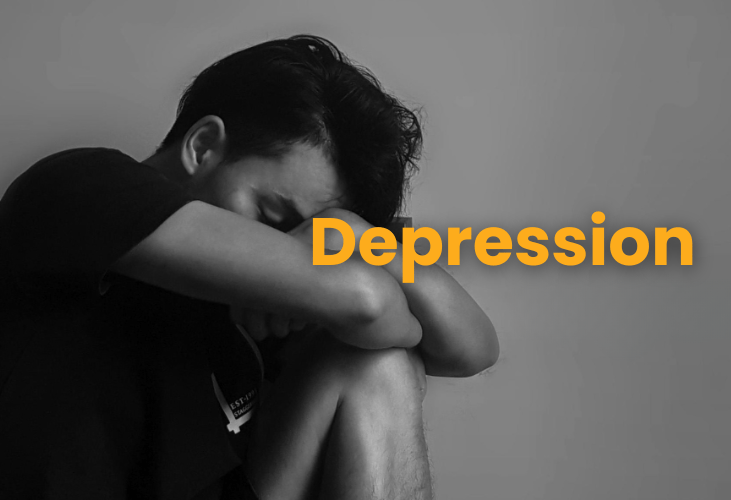Depression Management: A Comprehensive Guide to Understanding, Addressing, and Overcoming Depression
Introduction to Depression Management
Depression management focuses on a holistic approach to managing symptoms, improving quality of life, and promoting long-term emotional well-being. It involves a combination of self-help strategies, professional treatments, lifestyle changes, and emotional support. Addressing depression early can prevent complications and restore mental health.
Circumstances That Lead to Depression
Depression doesn’t appear without reason; it often develops from specific life circumstances that trigger emotional distress. While not all circumstances lead to depression for everyone, certain situations make individuals more vulnerable. Some common circumstances that contribute to depression include:
1. Loss of a Loved One: The grief from losing someone close can lead to prolonged feelings of sadness that may develop into depression.
2. Chronic Illness: Battling long-term illnesses such as diabetes or heart disease can lead to feelings of helplessness and hopelessness, contributing to depression.
3. Financial Struggles: Economic pressures such as unemployment, debt, or financial instability often trigger anxiety and depressive symptoms.
4. Isolation or Loneliness: A lack of social support or prolonged periods of isolation can create a fertile ground for depression to grow.
Understanding these circumstances helps individuals and healthcare professionals identify people who might be at greater risk of developing depression, allowing for early intervention.
Common Triggers of Depression
Triggers are specific events or experiences that can provoke the onset of depressive episodes. While triggers vary between individuals, there are some common factors that exacerbate depressive symptoms:
1. Stressful Life Events: Major life changes such as divorce, job loss, or relocation can heighten feelings of stress and anxiety, potentially leading to depression.
2. Trauma: Experiencing physical or emotional trauma, including abuse or violence, can lead to post-traumatic stress and depression.
3. Substance Abuse: Alcohol and drug misuse often co-occur with depression, creating a vicious cycle of dependency and emotional instability.
4. Negative Thinking Patterns: Habitual negative thoughts, self-criticism, or catastrophizing (expecting the worst) can trigger and worsen depressive symptoms.
Recognizing these triggers is crucial in depression management as it allows individuals to anticipate and mitigate potential depressive episodes.
Risk Factors for Depression
Several risk factors make individuals more susceptible to developing depression. These include:
1. Genetics: A family history of depression or other mental health disorders increases the likelihood of developing depression.
2. Biochemical Imbalances: Neurochemical changes in the brain, particularly in serotonin and dopamine levels, can contribute to depressive symptoms.
3. Personality Traits: Individuals with low self-esteem, who are overly dependent, or who tend to worry excessively may be more prone to depression.
4. Previous Mental Health Conditions: Individuals who have experienced anxiety disorders, bipolar disorder, or other psychiatric illnesses are at higher risk.
Being aware of these risk factors allows individuals to take preventive measures, such as seeking early counseling or support, to avoid developing or worsening depression.
Effective Solutions and Treatments for Depression
Depression is treatable, and individuals have multiple options to help manage their condition effectively. The best approaches often combine medical interventions, therapy, and lifestyle changes. Key solutions for managing depression include:
1. Psychotherapy
Cognitive Behavioral Therapy (CBT) and other forms of psychotherapy are proven methods for treating depression. They help individuals identify and change negative thinking patterns and develop healthy coping strategies.
2. Medications
Antidepressants, such as SSRIs (Selective Serotonin Reuptake Inhibitors), can help balance brain chemicals associated with mood regulation. While medication alone may not resolve all depressive symptoms, it is highly effective when combined with therapy.
3. Lifestyle Modifications
Implementing healthy lifestyle changes can significantly improve mental health. These include:
– Exercise: Regular physical activity boosts endorphins, the body’s natural mood enhancers.
– Diet: Eating a balanced diet rich in omega-3 fatty acids, vitamins, and minerals supports brain health.
– Sleep: Maintaining a regular sleep schedule helps regulate mood and energy levels.
4. Mindfulness and Relaxation Techniques
Mindfulness practices like meditation, yoga, and deep breathing exercises can help manage stress and anxiety, reducing the likelihood of depressive episodes.
5. Social Support
Connecting with friends, family, or support groups is vital for maintaining mental health. Social support provides emotional outlets and a sense of belonging that counteracts feelings of isolation.
6. Alternative Therapies
Alternative treatments such as acupuncture, massage therapy, and herbal supplements (like St. John’s Wort) can complement traditional medical treatments. However, it is essential to consult a healthcare provider before starting any alternative therapy.
Benefits of Depression Management
Managing depression effectively can lead to significant improvements in an individual’s life. Some of the benefits of successful depression management include:
– Improved Mental Clarity: By reducing depressive symptoms, individuals can think more clearly and make better decisions.
– Enhanced Emotional Stability: Managing depression leads to more consistent mood regulation, reducing the intensity of emotional highs and lows.
– Better Physical Health: Mental and physical health are interconnected. Treating depression can lead to reduced fatigue, better sleep, and improved immune function.
– Increased Productivity: Overcoming depression allows individuals to engage more fully in work, hobbies, and social activities.
– Improved Relationships: As mood stabilizes, individuals often experience stronger personal and professional relationships.
Conclusion
Depression management is an ongoing process that requires a combination of self-awareness, professional support, and lifestyle adjustments. By understanding the circumstances, triggers, and risk factors that contribute to depression, individuals can take proactive steps to manage their mental health. Early intervention, psychotherapy, medication, lifestyle changes, and social support all play a vital role in managing depression effectively. The benefits of these treatments are far-reaching, enhancing not only mental and emotional well-being but also overall quality of life.
At NirvaanaCare, we believe in holistic mental wellness and offer comprehensive support for individuals battling depression. With the right approach and resources, overcoming depression is possible, and everyone deserves the chance to live a fulfilling, joyful life.


